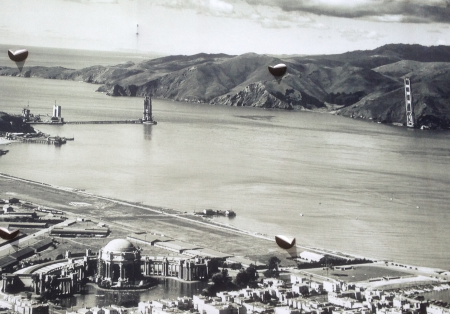Way back in time, hundred year ago, we was movin’ out across the broad prairie of mid-America, slappin’ them horse teams so’ they would pull them wagon out across the grasslands and the badlands, and then blastin’ our way ‘cross the Rockies and Sierras all the way to Pacific and the promised land of California.
And it was a helluva time gettin’ through all that but we managed to do it, with more than a few tragedies and atrocities along the way, but what can you say, history is full of ’em: travesties.
Troubles, wherever men go– travesties, trials and tribulations. That’s just the way it is in this world. If there’s a way around it, we haven’t found it yet.
But there has been progress too, if you wanna call it that. Mankind on the upswing, everybody get’n more of whatever there is to get in this life, collectin’ more stuff, more goods, services, and sure ’nuff more money.
Movin’ along toward the greatest flea market in history, is kinda what we were doing.
Taming the land, transforming the planet into our own usages, improving, or so we thought, on God’s original versions.
After that great westward expansion transference/transgression, had been goin’ on for a good while, and a bad while now that you mention it, we Americans found ourselves high up on a bluff overlooking history itself. At Just about that time, them Europeans had a heap of trouble that they’d been brewin’ over there and they dragged us into it on account of we had become by that time quite vigorous, grasping the reins of manifest destiny and ridin’ along, as so it seemed, on the cusp of history, seein’ as how we had been raised up on our daddy’s Britannic colonizing, mercantiling knee.
Then long about 1914, them Europeans dragged us into their big fatally entreched mess over there and we went and fought the first Big War, fought them high and mighty Germans that first time and when we got done with it and got back over here the world was a different place.
I mean the world was a different place, no doubt about it.
For one thing, everybody in the civilized world was so glad to have a little peace in 1920, we just went hog wild.
Everybody got out there a-workin’, roarin’ ’20s zeitgeist, scrapin’ crops out o’ the ground, building great machines, skyscrapers. Edison had electrified us; Bell had sounded the bells of modern communication; Ford had tinkered us into a vast new world of mass production with a horseless carriage in every garage and a chicken in every pot and and we were skippin’ right along like a cricket in the embers.
‘Til ’29, when the big crash came along.
https://www.youtube.com/watch?v=39RKRelTMWk
Some folks said that Mr. Hoover, great man that he was, was nevertheless clueless, and so the nation turned to Mr. Roosevelt for new answers. FDR, young cousin of Teddy Roosevelt who had been the father, so to speak, of American progressivism– cousin Franklin D., Governor of New York, took the bull by the horns and somehow managed to breed it into a donkey.
So from Teddy’s bullmoose progressivism there arose, through 1930’s-style unemployed populist cluelessness, Americanized Democratic Socialism; with a little help from FDR’s genteel patriarchal largesse, the New Deal saved Capitalism, or so it is said among the theoreticians and the ivory tower legions who followed, and are still following, in Roosevelt’s wake.
Well, by ‘n by, between Lyndon Johnson’s grand Texas-size vision for a Great Society, Clinton’s good-ole-boy nod to residual crony capitalism, and then the 21st-century-metamorphosing, rose-colored proletarian worldview as seen through Obama’s rainbow glasses, and now the upswell of Bernie’s refurbished wealth redistribution wizardry– we’ve turned this corner into a rising tide of flat-out Democratic Socialism.
It will be, quite likely, soon inundating the tidal basin inside the beltway as in 2017 we slog into the mucky backwaters of full-blown Americanized Socialism, dammed up on the other side of the slough by that other guy whose oversimplified version of the nation and the world seems to want to land us in a brave new world of American National Socialism.
And who knows which way this thing will go; only time and the slowly softening sedentary, dependent American electorate can tell.
Looking back on it all, today, my 65th birthday, having lived through Nov22’63, April4’68, 9/11, yesterday’s disruptions wherever they may be, and everything in between, I find myself identifying with all the old folks whose weary outmoded facial expressions bespoke disdain, while I traipsed errantly along life’s way. Here’s to all them ole folks who I thought were a little out of it, one brick shy of a load, peculiar, decrepit and clueless. Now, I can relate.
How I wish America could be back at real work again, like we were back in the day.
We’ve pushed through vastly extracted frontiers that yielded to massive infrastructure networks punctuated with skyscraping towers of steel and concrete. Now we’re lapsing into solid-state, navel-gazing nano-fantasies, living vicariously through celebrities in our pharma cubicles.
Maybe there’s a new frontier in there somewhere but I’m having a hard time seeing it.
But hey! let me conclude this rant with a hat-tip to the man–he happens to be a Canadian–who best eulogized the essence of that once-and-future great North American work zeitgeist, which seems to be disappearing into the dustbowl of history, because it looks like there’s nowhere left to go.
https://www.youtube.com/watch?v=NjoU1Qkeizs
Well, maybe there is somewhere.


